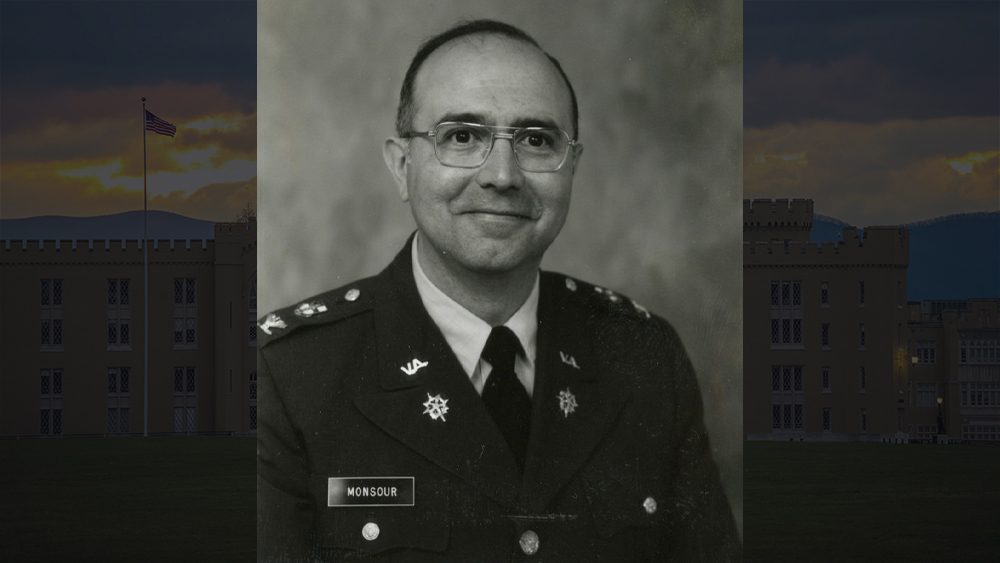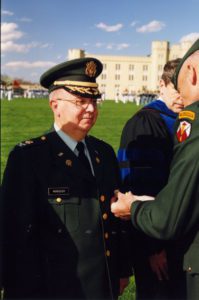In Memory: Col. Mike E. Monsour (Hon.)

A long-time professor who was renowned for his devotion to VMI and the Corps of Cadets, Col. Mike Ellis “Doc” Monsour, Ph.D., died March 8, 2021.

A long-time professor who was renowned for his devotion to VMI and the Corps of Cadets, Col. Mike Ellis “Doc” Monsour, Ph.D., died March 8, 2021.
A long-time professor who was renowned for his devotion to VMI and the Corps of Cadets, Col. Mike Ellis “Doc” Monsour, Ph.D., died March 8, 2021, aged 77.
Born in Natchez, Mississippi, in November 1943 to Lebanese immigrants, Monsour grew up in Vicksburg, Mississippi, and he never lost the distinctive accent of the Delta.
Two other things acquired in his youth he never lost were a deep Christian faith and a keen sense of service. Raised in the Antiochian Orthodox Church, he studied theology as well as Biblical Hebrew and Greek under the guidance of his parish priest and, at age 18, took minor vows. His service included volunteering at his parish and in hospitals, orphanages, a public home for the elderly, and a prison.
He also developed a love of music and an ability for languages. The latter was necessary, as Arabic was his family’s primary language and was further developed by his religious studies. His appreciation of music led to him playing the title role in the opera, “Amahl and the Night Visitors,” at 10; it also led to the offer of a scholarship to study voice at Bellhaven College in Mississippi.
It was at Bellhaven where he decided that, although many expected him to become a priest, his vocation lay elsewhere. As he said in a 1999 article in the Institute Report, “I wanted to teach.” To that end, he continued his studies at the University of Mississippi, completing a master’s degree in romance languages in 1968. He later earned a Ph.D. at the University of Georgia.
It was during his last year at Mississippi that a VMI alumnus and fellow graduate student urged Monsour to consider teaching at VMI. Although he had never heard of VMI, he sent a letter of application and was invited to post. There, in the space of a day, he met with Col. Albert Lancaster, head of the modern languages department; then-Col. James J. Morgan ’45, dean of the faculty; and Maj. Gen. Robert Shell, Class of 1931 and then-superintendent—and received a job offer. He accepted and began teaching at VMI that fall.
For the next 33 years, he diligently followed his vocation, serving colleagues and cadets alike as a professor of modern languages teaching French and Spanish. To his colleagues and cadets, he displayed a warm and welcoming manner, as well as an often sly sense of humor.
Col. Don Sunnen, Ph.D., the current head of the Department of Modern Languages and Cultures, remembered his first meeting with Monsour when he arrived in July 1990 to meet the dean of the faculty. “He and Mike Harris, then-head of modern languages, picked me up at the Roanoke airport for the trip to Lexington. Mike Monsour dutifully instructed me on how to pronounce the local place names, starting with Buchanan, Botetourt, Staunton, and that bane of every Spanish teacher’s existence, Buena Vista. The message seemed to be that though we are foreign language professors, the local population will always determine how to say the name.”

Col. Mike Monsour (Hon.) at his retirement ceremony April 13, 2001. Mounsour dedicated 33 years of service to the Institute.
Daryl Deke ’82, who took Spanish from Monsour, described him as “a solid educator. He always was available for assistance and was full of good humor with those of us who did not have the ear, as he did, for romantic languages. One specific memory I have about his teaching style is that he would not tolerate sleeping in his class. He would eye a cadet sleeping and continue his monologue but ever so quietly sneak up on the cadet with a metal trash can. Then he would unload on that can in the cadet’s ear. I was one of many who had to be peeled off the ceiling after being woken so abruptly. But it was hilarious to see it happen to someone else.”
During his time at VMI, Monsour also developed another vocation: Counselor. As he stated in the 1999 article, he sensed he had a special bond with people. “When I was at Bellhaven … the other students often called me ‘Old Man.’ I guess I did have a different perspective than many of them, but I’ve always felt a calling to listen to others.”
It was in this role that many alumni—regardless of major—have warm memories of Monsour. Every year, dozens—perhaps hundreds—of cadets would come to his office seeking advice, guidance, or just a sympathetic ear. Yet, Monsour was never satisfied to offer advice and support only when asked. He often went to cadets he thought needed assistance. Deke described the source of this behavior as an “intuition for the benefit of others.”
Deke continued, “I was from Miami, Florida, and I didn’t always have the money to travel back during short furloughs. He would always make sure I had somewhere to stay. Like many cadets, particularly in that era, we suffered with getting proper nutrition. He would take me and others many, many times to a diner south of town on Route 11, which had an all-you-could-eat buffet that included fresh vegetables. He would pay every time for all of us as we gorged ourselves on that food. I am surprised that diner’s owners didn’t pay him to stop bringing us, because we probably ingested all their profits!
“He was always aware of us. No one got lost with him. Whenever any of us were struggling with personal issues (girlfriends, depression, loneliness), he was there, in comfort. In my 1st Class year, our football team was 5-0-1 through its first six games, and it had beat Army at West Point. The Wednesday before the Virginia game, we drummed out our team captain. Many of the 1st Class members of the football team were aware of the case, and the Honor Court president was a starting defensive end. We were all close friends, and we were all devastated. In response to the news, Doc sought me out—and others, as well—just to be there for us.”
Thomas Brashears ’95, VMI Alumni Association chief operating officer, said of Monsour, “His ability to connect with cadets was unmatched,” and recounted the moment when he first experienced that connection. “I remember vividly sitting in my French class as a rat, two days before Thanksgiving furlough. I had just heard from my father that my childhood dog had passed, so I wasn’t paying attention to much of what was going on. Doc recognized my situation and spent about 30 minutes after class to help me process what I was dealing with. I never forgot that and leaned on him quite a bit over the years.
“His ability to help you process your thoughts and feelings and to think of how better to handle certain situations was invaluable. Later in life, as I began work in the mental and behavioral health field, I often thought of how Doc Monsour helped me get through some very tough times. I imagine he had the same impact on a lot of VMI alumni.”
In 1981, Monsour was named the head of his academic department and received a title that codified a long-standing reality—special assistant to the superintendent for counseling. In 1999, he was asked how he approached this role. Besides strict confidentiality, he said, “Active listening is the key. I try to be like a mirror, reflecting back on what I’m hearing, allowing the speaker to discover his or her options and what might be the consequences associated with each option. I absolutely will not sit in judgment of another.”
He might have added a deep and abiding caring for the cadets. Sunnen remembered that Monsour’s feelings were never far beneath the surface, especially when he had to inform cadets of a family illness or death. “We could tell how deeply he was affected by cadet concerns from the way he would utter an exclamation in Arabic.”
Monsour served as advisor and was an honorary brother rat of the Class of 1979. He received the VMI Distinguished Service Award twice (1982 and 1993), the Distinguished Teaching Award in 1990, and the VMI Achievement Medal in 1998. In 2001, the year of his retirement, the VMI Alumni Association paid him the highest accolade for non-alumni who devotedly serve the Institute and its cadets by naming him as an honorary alumnus.
He is survived by his sister, a brother, and two nieces. As Deke explained, Monsour will be fondly remembered by innumerable alumni as a man “whose gift was his humanity and who was a caring, gentle soul … always available to listen, counsel, and help.”

The communications officer supports the strategy for all communications, including web content, public relations messages and collateral pieces in order to articulate and promote the mission of the VMI Alumni Agencies and promote philanthropy among varied constituencies.